 Boogiepop wa Warawanai is a funny sort of show to be sure. It’s never one that I find myself obsessing over emotionally, but that’s by design – Kouhei Kadono quite intentionally keeps the audience at an arm’s width from the events in the story. But there’s something rather special about this series, nevertheless. On their own either Boogiepop’s pure intellectual ambition or its historical importance would make it notable as a series. Together, they’re more than enough to stamp it as one of the more interesting and important anime of the season.
Boogiepop wa Warawanai is a funny sort of show to be sure. It’s never one that I find myself obsessing over emotionally, but that’s by design – Kouhei Kadono quite intentionally keeps the audience at an arm’s width from the events in the story. But there’s something rather special about this series, nevertheless. On their own either Boogiepop’s pure intellectual ambition or its historical importance would make it notable as a series. Together, they’re more than enough to stamp it as one of the more interesting and important anime of the season.
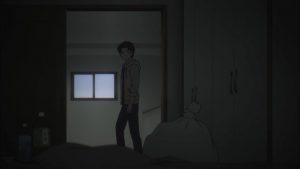 Truly, Boogiepop wa Warawanai is fascinating both for the ideas it trades in and what it represents as a franchise. As noted earlier it was one of the first light novels – argued by many to be the very first, and first to be adapted into anime. It illustrates the complete evolution of the LN format, which started out as a vehicle to explore difficult themes with more detach and depth than was possible in manga, and has now become the complete opposite – a shallow pool of simplistic world-views and stifling thematic homogeneity where exposition is almost always by explanation (and usually on page one).
Truly, Boogiepop wa Warawanai is fascinating both for the ideas it trades in and what it represents as a franchise. As noted earlier it was one of the first light novels – argued by many to be the very first, and first to be adapted into anime. It illustrates the complete evolution of the LN format, which started out as a vehicle to explore difficult themes with more detach and depth than was possible in manga, and has now become the complete opposite – a shallow pool of simplistic world-views and stifling thematic homogeneity where exposition is almost always by explanation (and usually on page one).
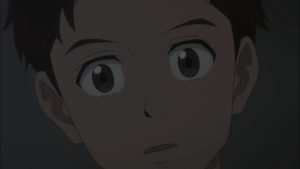 That evolution is a fascinating topic (I would argue that the accent has shifted from the second word of the medium’s name to the first), but deserving of its own forum. For now, to Boogiepop wa Warawanai – which concluded its best arc of this season with a good deal of flourish and style. Speaking of the things that make this version special, Yuuki’s Aoi’s titular performance is certainly one of them. And this episode was a delight in that it featured more of it than any so far. Yuuki is such a great actor, truly, with a seemingly limitless range and a sensitivity that belies her age (though it feels like she’s been around forever, she’s still only 26).
That evolution is a fascinating topic (I would argue that the accent has shifted from the second word of the medium’s name to the first), but deserving of its own forum. For now, to Boogiepop wa Warawanai – which concluded its best arc of this season with a good deal of flourish and style. Speaking of the things that make this version special, Yuuki’s Aoi’s titular performance is certainly one of them. And this episode was a delight in that it featured more of it than any so far. Yuuki is such a great actor, truly, with a seemingly limitless range and a sensitivity that belies her age (though it feels like she’s been around forever, she’s still only 26).
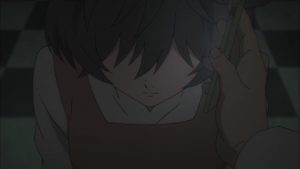 Yuuki’s Boogiepop is a masterwork, an intentionally flat characterization that manages to pack incredible depth through subtlety. It’s like a puff pastry that’s been folded upon itself over and over, consisting of countless layers despite being light and seemingly narrow. He turns up at Paisley Park just as Masaki-kun is about to be subjected to the same brainwashing as his attackers, but Boogiepop isn’t there because he considers Imaginator (and by extension Jin) a threat – she’s just trying to keep Suema out of trouble. Still, one wonders if Boogiepop is truly so detached as he claims – he does have a habit of saving good people from evil an awful lot for someone who’s just acting more or less as a watchman. The ironic similarity between Boogiepop and the series which shares his name surely isn’t coincidental.
Yuuki’s Boogiepop is a masterwork, an intentionally flat characterization that manages to pack incredible depth through subtlety. It’s like a puff pastry that’s been folded upon itself over and over, consisting of countless layers despite being light and seemingly narrow. He turns up at Paisley Park just as Masaki-kun is about to be subjected to the same brainwashing as his attackers, but Boogiepop isn’t there because he considers Imaginator (and by extension Jin) a threat – she’s just trying to keep Suema out of trouble. Still, one wonders if Boogiepop is truly so detached as he claims – he does have a habit of saving good people from evil an awful lot for someone who’s just acting more or less as a watchman. The ironic similarity between Boogiepop and the series which shares his name surely isn’t coincidental.
 Without any question the key moment of the episode comes when Boogiepop saves Masaki. He lets him know that he’s been brainwashed by Spooky E – “his fear suspended” – and he begins to wonder whether his feelings for Camille are a result of this. “Adapting yourself to society is essentially brainwashing yourself to meet societal expectations”, Boogiepop tells Masaki – but not to validate his doubts, but rather dispel them. “Now the problem is, within your psyche – which has no freedom – what do you value the most?” Even if free will is an illusion, our own feelings are not – those are genuine, and the best thing we can do is follow the strongest of them. And there’s no question where that will lead Masaki.
Without any question the key moment of the episode comes when Boogiepop saves Masaki. He lets him know that he’s been brainwashed by Spooky E – “his fear suspended” – and he begins to wonder whether his feelings for Camille are a result of this. “Adapting yourself to society is essentially brainwashing yourself to meet societal expectations”, Boogiepop tells Masaki – but not to validate his doubts, but rather dispel them. “Now the problem is, within your psyche – which has no freedom – what do you value the most?” Even if free will is an illusion, our own feelings are not – those are genuine, and the best thing we can do is follow the strongest of them. And there’s no question where that will lead Masaki.
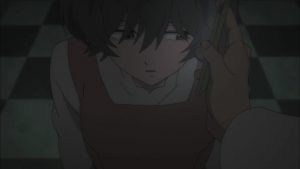 Well, that’s a pretty big intellectual matzoh ball, no question about it – at the center of philosophical debate for literally thousands of years (though more so since the Enlightenment to be sure). But then, Boogiepop is not shy about pondering big ideas and difficult issues (like suppressed homosexual attraction, back when that topic was still extremely taboo in manga and anime). In terms of events on the ground, what’s striking here is how little the struggling of humans like Masaki and Camille and Jin – and even beings like Imaginator – matter to Boogiepop, who by design has to look at the big picture.
Well, that’s a pretty big intellectual matzoh ball, no question about it – at the center of philosophical debate for literally thousands of years (though more so since the Enlightenment to be sure). But then, Boogiepop is not shy about pondering big ideas and difficult issues (like suppressed homosexual attraction, back when that topic was still extremely taboo in manga and anime). In terms of events on the ground, what’s striking here is how little the struggling of humans like Masaki and Camille and Jin – and even beings like Imaginator – matter to Boogiepop, who by design has to look at the big picture.
 In the end Jin was a self-obsessed blowhard, pretty much – even his supposed power to change hearts was merely a short-lived affectation, with the victims’ own feelings always overcoming his changes in short order. Imaginator is a paper tiger too, likewise self-obsessed – blind to anything but its own ambition and thus unable to adjust to anything that doesn’t go according to plan. This is another big philosophical debate Boogiepop wa Warawanai is teasing here – Boogiepop’s rather passive approach contrasted with Imaginator’s polar opposite view that the self is everything, and anything in society that conflicts with the desires of the self is to be struggled against with all available energies. This is not over, surely, because these questions are at the very heart of the series.
In the end Jin was a self-obsessed blowhard, pretty much – even his supposed power to change hearts was merely a short-lived affectation, with the victims’ own feelings always overcoming his changes in short order. Imaginator is a paper tiger too, likewise self-obsessed – blind to anything but its own ambition and thus unable to adjust to anything that doesn’t go according to plan. This is another big philosophical debate Boogiepop wa Warawanai is teasing here – Boogiepop’s rather passive approach contrasted with Imaginator’s polar opposite view that the self is everything, and anything in society that conflicts with the desires of the self is to be struggled against with all available energies. This is not over, surely, because these questions are at the very heart of the series.
 As to Camille/Aya and Masaki’s story, that does largely seem to be over for now – and all things considered, it ends on an upbeat note. Despite what Aya believes about Jin being unable to alter her because she’s not human, the real reason is the strength of her feelings for Masaki. And he accepts that those feelings are what’s most important to him, whatever else society may have to say. Even Jin is left to pick up the pieces (and perhaps a neck brace), though one suspects his life is in a far darker place than Masaki and Camille’s, given where he started out. And all of this is important, because one reason the “VS Imaginator” arc worked as well as it did is that it connected on a human level much more strongly than the episodes that preceded it. And for Boogiepop, the series or the character, one suspects that’s more important than it first appears to be.
As to Camille/Aya and Masaki’s story, that does largely seem to be over for now – and all things considered, it ends on an upbeat note. Despite what Aya believes about Jin being unable to alter her because she’s not human, the real reason is the strength of her feelings for Masaki. And he accepts that those feelings are what’s most important to him, whatever else society may have to say. Even Jin is left to pick up the pieces (and perhaps a neck brace), though one suspects his life is in a far darker place than Masaki and Camille’s, given where he started out. And all of this is important, because one reason the “VS Imaginator” arc worked as well as it did is that it connected on a human level much more strongly than the episodes that preceded it. And for Boogiepop, the series or the character, one suspects that’s more important than it first appears to be.



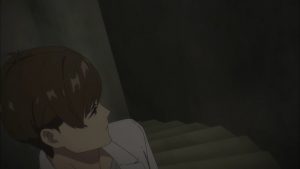

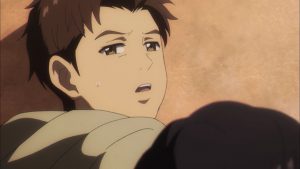


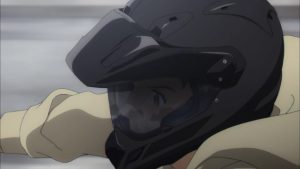



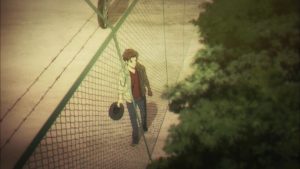


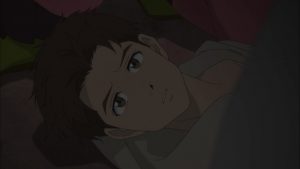

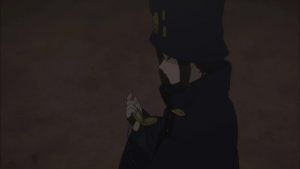

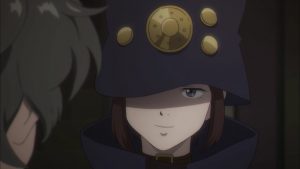
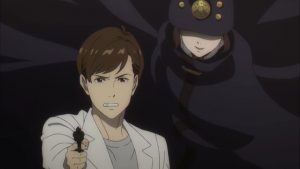

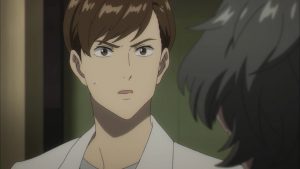




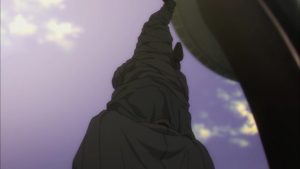
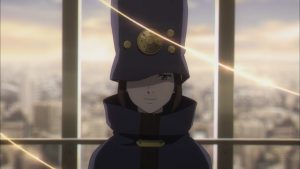
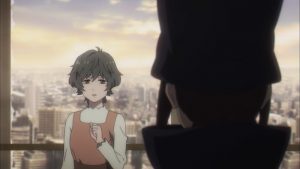








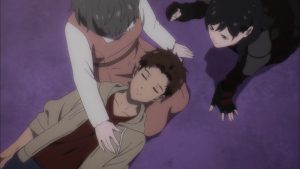

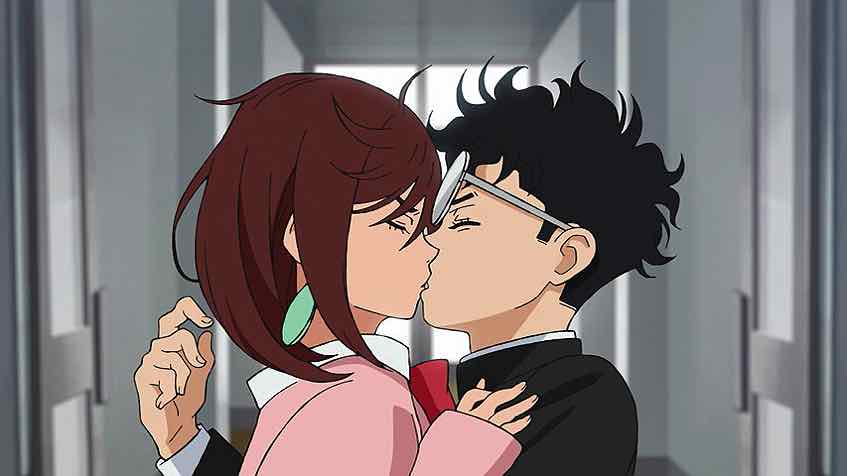
TheYepMan
February 24, 2019 at 3:45 amIt’s funny that you mention that this show is one of the most important and interesting of the bunch (I think so too, I’ll say as much) when a large part of the audience dropped it as far back as Episode 1 for being a “terrible adaptation”.
And I wonder: Is it that people already got used to a certain kind of show, a certain kind of LN, and don’t remember (or else, don’t even know) how the Boogiepop LN was written? Is it that they think that every single detail is necessary to “truly convey” what the story means, or is it that they’re disappointed that this show isn’t focusing on their own reading of Boogiepop, instead focusing on how the staff of this adaptation read the work (because well, that’s an inevitability)?
Because well, the Boogiepop that I remember is vague and mysterious enough that one’s interpretation of the text is extremely important. This is not a work that can easily fill wikis, it’s more of a work that can easily fill message boards with discussion threads.
Jindujun93
February 24, 2019 at 6:53 amLight novel reader chiming in here, if you don’t mind. Personally, I’m pleased with how the adaption has been handling things, for the most part. Admittedly, the first arc was rushed, but I can see why they did it – it was meant to serve as an introduction, and the real meat of the story happened in later novels (though novel 1 was also pretty good, just the weakest out of the five that the anime will cover). VS Imaginator actually had a similar pacing (3 episodes per volume, was a two-parter), but here they nailed the essence much better – it helps that, just like Enzo said before, at it’s core VS Imaginator is a lot more on the human side than And Others is (best example being the Masaki & Aya subplot).
Admittedly, it’s too bad that a lot of the narration is missing from the novels, that was a charm point. But as Natsume’s interpretation, this here definitely works.
Guardian Enzo
February 24, 2019 at 10:27 amRealistically, I think a very small percentage of modern anime viewers have any real idea what Boogiepop is or what LNs were all about when they first entered the cultural lexicon. That disconnect is very much an issue for the series translating for a modern audience.